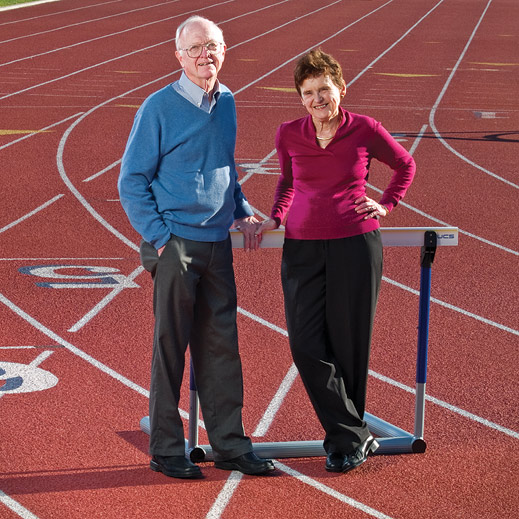Don Morrison earned a bachelor’s in mechanical engineering from MIT in 1961 and a PhD in operations research from Stanford in 1965. For 25 years, he has been a professor of management at the University of California, Los Angeles (UCLA). His primary research interests are probability and statistics. Sherie Morrison holds a bachelor’s and a PhD in biology from Stanford. A professor of microbiology, immunology, and molecular genetics at UCLA, she developed the antibody technology used to treat arthritis, multiple sclerosis, and some infectious diseases. Don left MIT as the number-two long jumper in its history. “Now, I’m number six but proud of it,” he says.

Don: “I began MIT in the middle of my class academically and by senior year, I had moved into the top 25 percent. I was on the track team, and that really boosted my confidence. Now, we support men’s and women’s track and field and the Department of Athletics, Physical Education, and Recreation because I consider athletics to be the main pressure release valve at the Institute. MIT wouldn’t be MIT without it, and the students, faculty, and staff wouldn’t be as energized, healthy, or satisfied.”
Sherie: “MIT is creating the next generation of leaders, which the country desperately needs. We wanted students to gain the best possible education. But that education isn’t just book learning. It’s learning how to compete, how to manage time, how to interact with others, and how to be a good teammate.”
Please consider your own unrestricted gift to MIT.
For information, contact Rob Scott: 617-253-3394; rscott@mit.edu. Or visit giving.mit.edu.
Keep Reading
Most Popular
Large language models can do jaw-dropping things. But nobody knows exactly why.
And that's a problem. Figuring it out is one of the biggest scientific puzzles of our time and a crucial step towards controlling more powerful future models.
How scientists traced a mysterious covid case back to six toilets
When wastewater surveillance turns into a hunt for a single infected individual, the ethics get tricky.
The problem with plug-in hybrids? Their drivers.
Plug-in hybrids are often sold as a transition to EVs, but new data from Europe shows we’re still underestimating the emissions they produce.
Google DeepMind’s new generative model makes Super Mario–like games from scratch
Genie learns how to control games by watching hours and hours of video. It could help train next-gen robots too.
Stay connected
Get the latest updates from
MIT Technology Review
Discover special offers, top stories, upcoming events, and more.